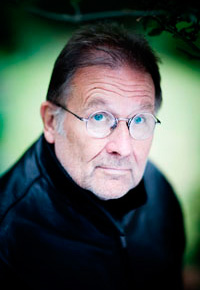Irmin Schmidt
Biography (English)
GERMAN2015 Irmin Schmidt is knighted by the French Ministry of Culture and receives the highly prestigious medal Chevalier De L'Ordre Des Arts Et Des Lettres for his contribution to art and music.
Spoon Records releases his 12 CD box Electro Violet - a complete set of Schmidts work (6 solo CDs and 6 Soundtrack CDs).
2013 Release of VILLA WUNDERBAR - double CD compilation of solo work and work for film curated by Wim Wenders
2012 Release of the 3 CD CAN Box THE LOST TAPES (a selection of previous unreleased Can material, curated by Irmin Schmidt)
Release of CYLCOPEAN (EP) with Kumo, Jaki Liebzeit and Burnt Friendman.
2010 31.7. Ludwigsburger Festspiele - Classical Festival Wim Wenders presents the gala to honor Irmin Schmidt's work, in particular his work for film. Irmin Schmidt conducts the Orchestra of the Schlossfestspiele and presents a selection of his work including Palermo Shooting« (Wim Wenders), »Schneeland« (Hans W. Geißendörfer) and the successful ARD-Series »Bloch« as well as the CAN- track »Spoon« which have all been arranged for orchestra for the event.
2009 Release of the double CD ANTHOLOGY SOUNDTRACKS VOL. 4-5
2008 Release of "Axolotl Eyes"
Premiere of the ballet "La Fermosa" in Düsseldorf and Duisburg.
Writes soundtrack for new Wim Wenders' film "Palermo Shooting", premiered in the official selection of the Cannes Film Festival.
2007 Finishes the second album Irmin Schmidt & Kumo "Axolotl Eyes".
Writes another three soundtracks.
2003 Along with his surviving band-mates receives an Echo lifetime achievement award in Germany. Continues writing film scores and touring with Kumo (France, Belgium, Holland, Spain, Italy, Portugal, Germany).
Oversees remastering of original CAN material together with Holger Czukay and Jono Podmore (a.k.a. Kumo) for the entire CAN catalogue for a re-release on Spoon/Mute.
Stages his Gormenghast opera at Völklinger Hütte in Saarbrüken, Germany, at the Grand Théatre Luxembourg.
Continues writing film scores and produces together with Kumo a solo-record of the Japanese artist Mito.
Composes ballet music for full orchestra commissioned by the Deutschen Oper Am Rhein Düsseldorf. The ballet, choreographed by Youri Vamos, is scheduled to be be premiered in Düsseldorf (01.03.2008), Tallin (06.2008), Prag (10.2008) and Riga (12.2008).
2001 - 2002 After extensive touring in Europe (including the Montreux Jazz Festival, the Sonar Festival in Barcelona, and the London Jazz Festival), the first Irmin Schmidt and Kumo album ("Masters of Confusion") is released worldwide on Spoon/Mute records in September to unanimous critical praise. In October, Irmin Schmidt and Kumo compose a specially commissioned sound installation for the "Electronik" festival, Barbican Centre, London.
1999 February, Premiere of "Gormenghast" at Musiktheater Gelsenkirchen.
He continues writing film scores and performs many concerts in numerous European cities together with Kumo (Jono Podmore: engineer, programmer and sound designer for Gormenghast) as part of CAN solo projects. Work begins on their first album.
1998 15th of November 1998 sees the World Premiere of the Opera "Gormenghast" at the Wuppertal Opera House.
1994 Under a commission from the Wuppertal Opera House he begins work on the the Fantasy Opera "Gormenghast", based on Mervyn Peake´s trilogy, with a libretto by Duncan Fallowell.
1982 He composes "Orchestermusic I-IV" commissioned by the city of Hamburg and conducts the orchestra of the Norddeutsche Rundfunk at the premiere in Hamburg.
1981 Relocates to the south of France, where he sets up his own studio and continues to work as a composer and producer releasing 3 solo albums (“Toy Planet”, “Musk At Dusk” and “Impossible Holidays”) and recording scores for over 60 film and television productions (including critically acclaimed television series "Rote Erde") and for numerous theatre productions. A triple CD boxed set “Anthology” documents his soundtracks from 1978-1993.
1968 - 1978 Founds the group CAN with whom he works exclusively for 10 years, releasing 18 albums and embarking on extensive international touring. With CAN he continues his work for film and television, completing 21 film scores for directors such as Wim Wenders, Samuel Fuller and Jerzy Skolimowski.
1962 - 1969 He conducts numerous orchestral concerts (including, Wiener Sinfoniker, Bochumer Sinfoniker, Radio-Sinfonie-Orchester Norddeutscher Rundfunk Hannover and "Dortmunder Ensemble für Neue Musik" which he founded) and performs Piano Recitals (especially in contemporary music). His compositions "Hexapussy" and "Ilgom" are premiered 1967 in Frankfurt and 1968 by Radio Stuttgart. Works as a musical director at the Stadttheater Aachen and teaches Musical and Chanson at the Bochum stage school. He also composes music for various film and theatre productions.
1957 - 1964 Studies in Music: Dortmund Conservatory (Piano and French Horn),
Essen Folkwang Academy (Orchestral conducting: Heinz Dressel)
Piano Masterclass: (Detlef Kraus, Composition: G. Ligeti)
Mozarteum Salzburg (Orchestral conducting: Istvan Kertesz)
Cologne Music Academy : New Music course - Composition: K.H. Stockhausen amongst others
Cologne University: Music ethnology
Awards for Conducting:
Folkwang Leistungs-Preis 1963
1st Prize Mozarteum Salzburg 1964
Bundesauswahl Junger Künstler 1965
